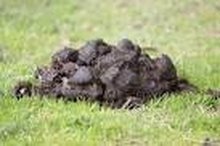A recent study by Michele Jay-Russell, a veterinarian and research microbiologist at the Western Institute for Food Safety and Security (WIFSS) and program manager of the Western Center for Food Safety, highlights the need to be aware of the hazards associated with using raw animal manure to fertilize home gardens.

Horse manure - Source of Salmonella
Study results showed that the raw horse manure applied as fertilizer was the most likely source of contamination of garden soil with Salmonella bacterial pathogens.
The basis for the study began in July of 2010 when a mare from a rural Northern California farm was brought to the William R. Pritchard Veterinary Medical Teaching Hospital at the UC Davis School of Veterinary Medicine for treatment of colic. Following protocol, the veterinarians on call screened the horse for Salmonella to avoid infecting other horses during hospitalization.
The mare tested positive and, after successful treatment for colic, went home. Her owners then notified the veterinarians that some of their other draft horses were sick as well—all 8 were tested and 6 came back positive for the same Salmonella Oranienburg strain including the mare that still had the infection.
Jay-Russell heard about the case from her colleague John Madigan, professor of medicine and epidemiology at the school. The farm’s owners invited Jay-Russell and Madigan to the farm to see if they could uncover the source of the Salmonella infection.
They sampled water from horse troughs, manure storage piles, wild turkey feces and soil from the family’s edible home garden where raw horse manure had been used as fertilizer. Each of those locations had a percentage of positive samples over the sampling period from August 2010 to March 2011.
While the researchers couldn’t be completely certain about the original source of Salmonella on the farm, they suspected that a recent surge in the wild turkey population on the property introduced the bacteria to the horses by pooping in the horse corrals and in the water troughs. They speculated that the wild turkeys brought the Salmonella onto the property, although they couldn’t rule out the possibility that the birds were exposed on the farm or to other potential sources of Salmonella.
“What is clearer is that the raw horse manure applied as fertilizer was the most likely source of garden soil contamination,” Jay-Russell explained. “We suspect that the damp climate in Mendocino County may have contributed to the longevity of this bacterium in the soil long after the owners stopped applying the horse manure to the garden. Fortunately, the owners didn’t get sick, but the investigation showed the potential for widespread dissemination of Salmonella in a farm environment following equine infection.”
Michelle Jay-Russell urges gardeners to take a class and learn how to compost correctly and safely. Each county has a farm advisor and many have University of California Extension specialists on hand as well.
